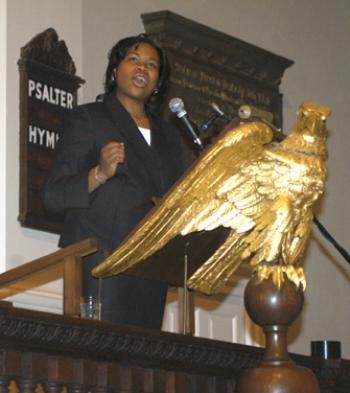
News
HMS Is Facing a Deficit. Under Trump, Some Fear It May Get Worse.

News
Cambridge Police Respond to Three Armed Robberies Over Holiday Weekend

News
What’s Next for Harvard’s Legacy of Slavery Initiative?

News
MassDOT Adds Unpopular Train Layover to Allston I-90 Project in Sudden Reversal

News
Denied Winter Campus Housing, International Students Scramble to Find Alternative Options
Harvard Celebrates Life of MLK Jr.

Students, faculty members, religious leaders and community members filled Memorial Church to celebrate the life of Martin Luther King Jr. and encourage each other to continue fighting for a more racially integrated society.
In addition to prayers and speeches, the service featured a dramatic reading by Jennifer N. Hawkins ’04 of King’s “I Have a Dream” speech and an appearance by the Kuumba Singers, who performed a selection of spirituals.
Gary Orfield, professor of education and social policy at the Graduate School of Education and co-director of the Civil Rights Project, told the crowd in his keynote speech, “Don’t Just Celebrate—Activate,” that King’s desegregation policies were threatened.
“Every place in the U.S., segregation is getting worse. We have deepened economic and housing polarization,” he added.
Public schools and cities across America have become increasingly divided geographically along racial lines, Orfield wrote in a study published this week.
On a day of celebration of King’s life, Orfield told the crowd that King’s legacy could best be strengthened by working to more fully integrate schools and cities.
“His victory was partial, but it is not secure, ” he said.
Orfield said King did not have the same success desegregating Chicago as he did in Birmingham and Selma earlier in his life.
Orfield, who heard King speak multiple times in Chicago, reminded listeners of the powerful emotional response King’s speeches elicited.
“Dr. King tried to trouble you, to make you think, not just intellectually. He wanted to reach into their souls.”
Orfield also had a message for Harvard students, who he urged to interact more with students from different backgrounds.
“You are in a generation where people of color will make up the majority,” he said.
Commenting on the privilege of attending Harvard, he said, “We need to take advantage of our own diversity. There aren’t many places like this.”
Orfield described the role students played during the Civil Rights Movement of the 1960s and challenged students to write about public affairs, to live in racially mixed areas and to fight for social justice.
“Write. Your generation needs to be heard. There’s more intelligence in this room than in the Cabinet,” he said.
While Orfield derided the Bush administration, he commended religious leaders for inspiring civil rights progress.
“Civil rights legislation would not have passed without religious support,” he said at the interfaith service.
Memorial Church was largely filled with students.
“The keynote speech was very enlightening for the way we celebrate his birthday. I liked the way he highlighted that King was not just a dreamer but an activist,” said Keneshia D. Washington ’07.
Black Students Association President Olamipe Okunseinde ’04 invited attendees to make a pledge and then act upon it.
“Let us commit ourselves to live in a world we always dreamed about,” she said.
Want to keep up with breaking news? Subscribe to our email newsletter.
